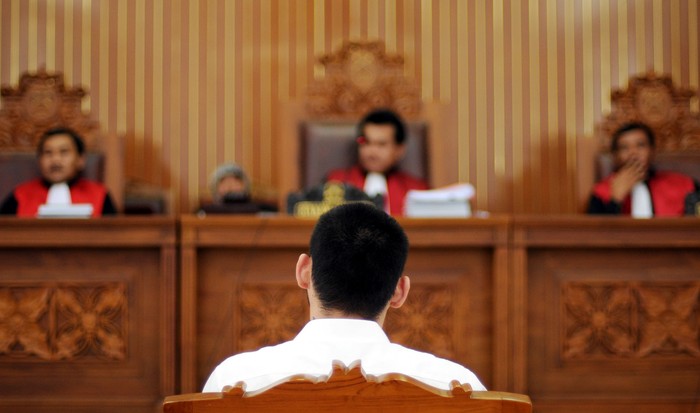The Judges Ethics and Justice: An Analysis of Law Enforcement in Indonesian Court System
Main Article Content
Abstract
Technical skills education in the field of law that neglects the aspect relating to the responsibility of a person to the person entrusted to him and his profession in general and the values and ethical measures that should be guidelines in carrying out his profession will only produce skilled handyman in the field of law and his profession. Such circumstances not only make the clinical education incomplete because the prospective member of the profession does not know how he should use his acquired technical skills. In fact, it is no exaggeration to say that technical skills education without the education of professional and ethical responsibility is dangerous. In general, it can be said that every profession puts the expert concerned in a special circumstance, both because of the extraordinary powers entrusted to him (such as judges and prosecutors) as well as the fate of the interested person entrusted to him (in the case of the defense). When viewed in the framework of law enforcement as a matter of public interest, that responsibility is essentially also a trust mandate concerning public interest (public trust). It is undeniable that certain positions or professions have special positions or duties because they are subject to more severe conditions than are generally applicable for good practice rather than their duties or functions and the protection of those concerned.
Article Details

This work is licensed under a Creative Commons Attribution-ShareAlike 4.0 International License.
All writings published in this journal are personal views of the authors and do not represent the views of this journal and the author's affiliated institutions. Author(s) are retain the copyrights of the Article. However, before publishing, it is required to obtain written confirmation from Author(s) in order to ensure the originality (Author Statement of Originality). The statement is to be signed by at least one of the authors who have obtained the assent of the co-author(s) where applicable.This work licensed under a Creative Commons Attribution-ShareAlike 4.0 International (CC BY-SA 4.0)
References
Asshiddiqie, J. (2019). Peradilan Eik Dan Etika Konstitusi: Perspektif Baru tentang ‘Rule of Law and Rule of Ethics’ & Constitutional Law and Constitutional Ethics. Jakarta: Sinar Grafika.
Bisri, I. (2004). Sistem Hukum Indonesia: Prinsip-prinsip & Implementasi Hukum di Indonesia. Jakarta: PT RajaGrafindo Persada.
Deu, M. (2015). Kode Etik Hakim Dan Komisi Yudisial Di Indonesia. Lex Et Societatis, 3(1).
Faqih, A. R. (2017). Kode Etik Dan Pedoman Perilaku Hakim. IN RIGHT: Jurnal Agama dan Hak Azazi Manusia, 3(1).
Hendrawati, H., Adhisyah, S. V. D. M., Yudhanto, M. C., & Putra, N. S. (2016). Aspek Penegakan Kode Etik Hakim dalam Mewujudkan Kekuasaan Kehakiman yang Bermartabat dan Berintegritas. Varia Justicia, 12(1), 100-134.
Kusumaatmadja, M. (2013). Konsep-konsep Hukum dalam Pembangunan. Jakarta: PT. Alumni.
Mangesti, Y. A., & Tanya, B. L. (2014). Moralitas Hukum. Yogyakarta: Genta Publishing.
Manullang, F. M. (2007). Menggapai Hukum Berkeadilan. Jakarta: Kompas.
Marzuki, S. (2015). Pengadilan yang Fair: Kecenderungan Pelanggaran Kode Etik dan Pedoman Perilaku Oleh Hakim. Jurnal Hukum Ius Quia Iustum, 22(3), 394-419.
Monteiro, J. M. (2007). Putusan hakim dalam penegakan hukum di Indonesia. Jurnal Hukum Pro Justitia, 25(2).
Muhammad, R. (2014). Eksistensi Hakim dalam Pemikiran Yuridis dan Keadilan. Jurnal Hukum Ius Quia Iustum, 21(3), 426-443.
Rahardjo, S. (2006). Ilmu Hukum. Bandung: PT Citra Aditya Bakti.
Republic of Indonesia. (2004). Undang- Undang Nomor 4 Tahun 2004 tentang Kekuasaan Kehakiman.
Republic of Indonesia. (2011). Undang-Undang Nomor 18 Tahun 2011 tentang Komisi Yudisial dan Surat Keputusan Bersama Ketua Mahkamah Agung Republik Indonesia dan Ketua Komisi Yudisial.
Ruman, Y. S. (2012). Keadilan Hukum dan Penerapannya dalam Pengadilan. Humaniora, 3(2), 345-353.
Saleh, K. W. (1977). Kehakiman dan Peradilan. Yogyakarta: Ghalia Indonesia.
Suhardin, Y. (2009). Fenomena Mengabaikan Keadilan dalam Penegakan Hukum. Mimbar Hukum-Fakultas Hukum Universitas Gadjah Mada, 21(2), 341-354.
Tanya, B. L. (2011). Penegakan Hukum dalam Terang Etika. Yogyakarta: Genta Publishing.
Utari, I. S. (2013). Etika dalam Sistem Peradilan Pidana. Semarang: CV Sanggar Krida Press.
Wiriadinata, L. (1989). Kemadirian Kekuasaan Kehakiman. Jakarta: Yayasan Lembaga Bantuan Hukum Indonesia.
Zulaikha, S. (2014). Etika Profesi Hakim dalam Perspektif Hukum Islam. Al-'Adalah, 12(1), 89-102.
